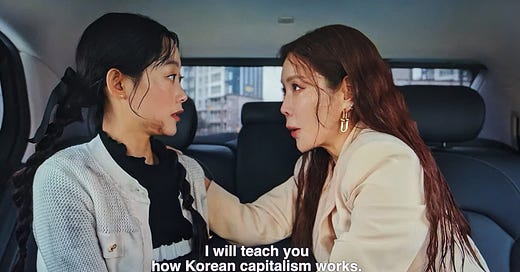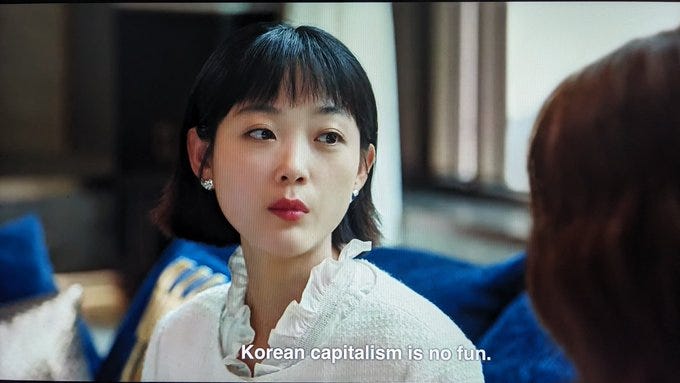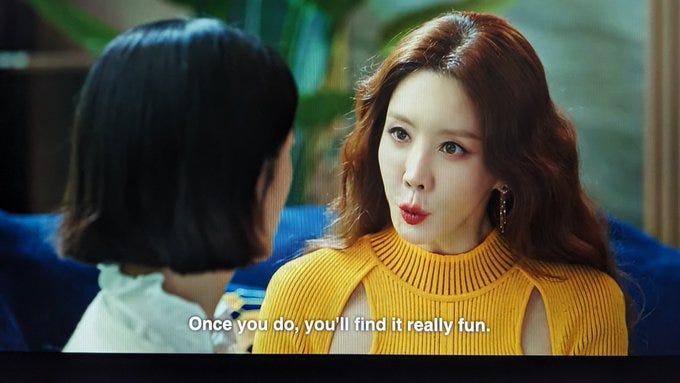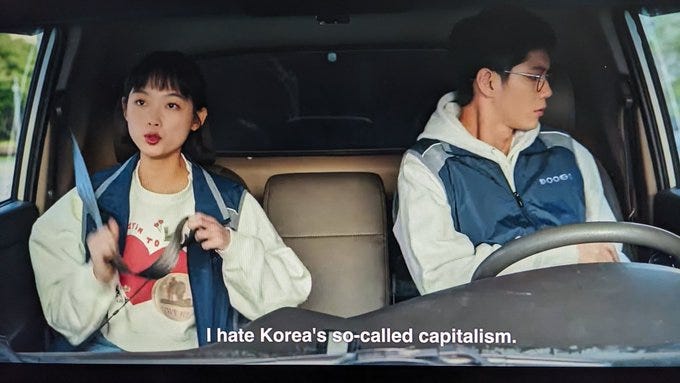Mother, Daughter and Capitalism in 'Strong Woman Nam Soon'
Chasing half baked social theories in the half baked plot of this drama
I don’t know if there is a scene more illustrative of the core theme of Strong Woman Namsoon than when Kang Namsoon reunites with her mother, ash-streaked from just saving children from a burning building, and Hwang Geum-joo vehemently swears to her, “I will teach you how Korean capitalism works,” as if to make up for every hurt and sadness Namsoon had ever faced in her young life.
After many years of searching for her daughter and dealing with scammers who came in to claim the spot, she has finally found her little girl. She’s adorable, supernaturally strong, and clearly brave, but Geum-joo is still heartbroken when she learns that her baby grew up in the vast open plains of Mongolia with very few luxuries.
To the mind of the woman who sees herself as a “good” rich person, this is the height of injustice in the world. So, she sets out to make things better the only way she knows how - by using her wealth to instantly solve all her child’s problems and promising a thorough induction in to the cult of capitalism, so that her daughter never suffers from lack of privileges again.
Within a few episodes though, it becomes clear that Namsoon has no interest in being part of the rich business class if it means looking down on the poor and homeless. When she brings up how little she has liked what she’s seen of Korean capitalism, her mother explains that it’s because she’s new to it and doesn’t understand how it work. Once she does, she’ll find fun!
(Feel like supporting my capitalist survival? Check my patreon page!)
This set up is fascinating to me! For it pits two drastically opposed socio-economic ideologies against each other within the same family. And unlike families where a child who grows up surrounded by one school of thought might slowly develop different ideas, Namsoon lived under the influence of an entirely different society for many years. For her, these aren’t theories to argue over at dinner. She knows what it’s like to live on a smaller income, sleep in a ger under wide open skies, share community spaces and resources, and prioritise sustainability over profitability.
She isn’t just developing new ideas, her lived experience stands in direct opposition to her mother’s, who grew up in a country where the only way to live a life of safety and plenty was fight tooth and nail to come out on top.
They come from different social systems and their early interactions show their differing perspectives quite clearly.
But this doesn’t mean that the show wants to explore the differences of consumerist capitalism and pastoral socialism in any depth. From the episodes immediately after the family’s reunion, it starts to become clear that the story’s gears have shifted.
Namsoon occasionally reminds us that she grew up outside capitalist South Korea, but aside from that, she begins to adjust quite nicely to its social mores.
Her desire to help the poor and champion the weak aren’t that different from her mother’s. The only difference lies in how they go about solving the problems. Namsoon uses her fist because that’s the only strength she has, while her mother uses her fist and her money and influence.
The show quite likes South Korean capitalism and that’s never more evident than in how it juxtaposes Namsoon’s helpless complaints of unfairness against Geum-joo’s effective use of her many resources.
The story’s ultimate argument seems to be: Namsoon’s socialist perspective is just the naivete of youth, while Geum-joo’s love of capitalism is the result of a lifetime of experience.
Though if you told me right now that writer Baek Mi-kyung had never given a moment’s thought to the social themes of the show, I would believe that too.








